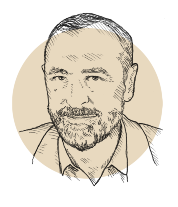We are constantly bombarded with moisturizing creams, cleansing gels, makeup removal lotions, and imperfection correctors. But what if the countless skincare products that women (and an increasing number of men) use in their daily beauty routines were actually doing more harm than good? This question pushed Elsa Jungman to launch a range of minimalist treatments designed for sensitive skin in 2019. Her underlying idea was that most of these products disrupt the skin microbiome, the name for the micro-organisms (bacteria, fungi, etc.) naturally present on the skin’s surface, and which protect it from being damaged.
This approach is at odds with the giants of the cosmetics industry – a sector that this energetic, driven thirty-something knows well. Before moving to the United States with her husband in 2015, she worked at a L’Oréal research lab after spending ten years studying biology, chemistry, and dermatology. “I’ve always been fascinated by the skin,” she says. “It’s partly down to my personal experiences. When I was 18, I suffered from toxic shock syndrome, a very rare and quite serious bacterial infection. It took a long time for me to get better, and I had extensive skin problems afterwards.”
Studies, Skin, and San Francisco
After graduating with a degree in biology and biochemistry in her native city of Paris, Elsa Jungman started a master’s in dermatological research in Lyon, which took her all the way to the U.S. West Coast. “I was lucky enough to spend a year at the University of California, San Francisco with a professor considered to be one of the world’s finest dermatologists, Howard Maibach.” Aside from discovering California, this trip pushed her to continue her studies with a PhD. “The doctoral title is not held in particularly high esteem in France, whereas PhD graduates are highly sought-after in the United States. That was what convinced me to return to Paris and start a thesis focused on skin analysis using chemistry techniques.”

Recruited by L’Oréal at the end of her studies, the young researcher dreamed of working abroad and felt hemmed in at her laboratory in Aulnay-sous-Bois northeast of Paris. When her partner, a data specialist, found a job at Tesla in San Francisco, she soon packed her bags and joined him. “We’ve always been very happy in California,” she says. “We’re at the beating heart of the innovation sector and I think that the American work ethic, which is very intense, suits us well. San Francisco is also a beautiful city; the pace of life can be frantic, but there is also so much nature on your doorstep.”
The change of country was accompanied by a professional transformation. After working for one of the biggest names in beauty, Elsa Jungman discovered the world of biotech start-ups. One of her first employers, AOBiome, is a pioneer in skin microbiome research. Founded in 2013 by an MIT engineer, the company develops medicines and skin products all based on ammonia-oxidizing bacteria (AOB). It was a revelation for the researcher. “Their philosophy was that this layer of micro-organisms plays a key role in skin health. Yet many ingredients in cosmetics destroy it, including preservatives, which are designed to prevent bacteria from developing, as well as fragrances and cleansing agents.”
Two years later, AOBiome decided to sell its consumer product range, Mother Dirt, to a branch of S.C. Johnson, a household cleaning product company known for the brands Mr. Muscle and Glade – hardly bacteria’s best friends.
Less Is More
This inspired Elsa Jungman to found her own skincare company, Elsi Skin Health. The business is part of the “clean beauty” movement that the researcher defines as “the desire to return to simpler, healthier products by moving away from major brands that use a lot of chemicals.” At Elsi, this ideal is reflected by a limited number of ingredients – just three or four, and all naturally sourced – and without water, to avoid using preservatives that damage the microbiome. “In cosmetics, extra ingredients are constantly added to have the perfect texture or fragrance, but I never felt comfortable with this approach. With that in mind, I tried to remove as many ingredients as possible and only keep those that are really effective on the skin.”

After winning the French American Entrepreneurship Award in 2019, Elsi went on to raise one million dollars through French and American investors, including the family office of the Yves Rocher group. “I used the money to open a laboratory, hire a chemist… and then Covid hit.” The year 2020 was particularly difficult for the fledgling company, as it struggled to stand out in an ultra-competitive market. This was when Elsi changed the name of its products, which are now sold under the brand Dr. Elsa Jungman, in order to showcase the researcher’s scientific expertise.
Positioned as an innovative start-up, the company is the first to have provided skin microbiome sequencing. “In may 2021, I offered to a limited number of people a 50-dollar microbiome analysis before and after testing our products.” The operation was a success, and inspired the founder to develop another one for this fall: microbiome sequencing kits based on the model of individual genetic tests, but focused on skin problems and how they relate to other factors such as stress and hormonal changes.
This technological approach has won over new investors, who helped raise funds for the company just before the summer. The capital raised will also be used to bring the brand out of the United States and onto the international stage. “As a French woman in California, I am in quite a unique position. Many Americans admire France, particularly for its beauty products, and our consumers love the idea of buying from a woman who is both French and a scientist!”
Article published in the September 2021 issue of France-Amérique. Subscribe to the magazine.












